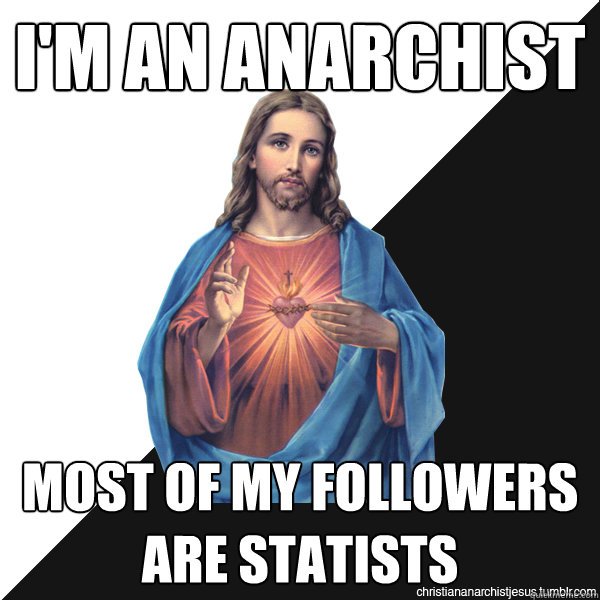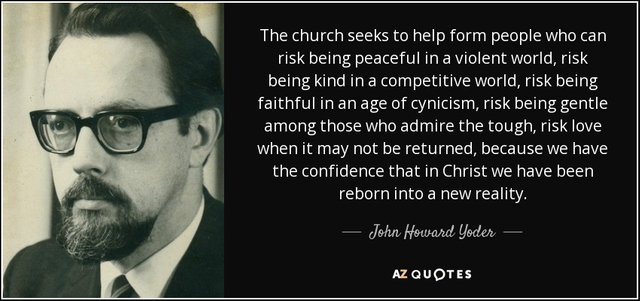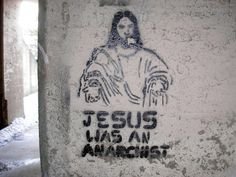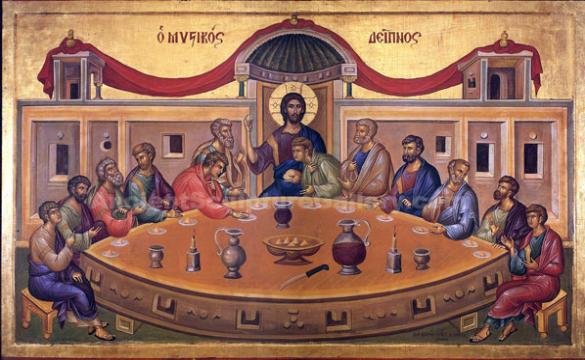Anarchism & Christianity (Part 2): The Anarchism of Jesus Christ
The God of Jacob is our refuge. Selah
Come, behold the works of the LORD,
Who has made desolations in the earth.
He makes wars cease to the end of the earth;
He breaks the bow and cuts the spear in two;
He burns the chariot in the fire.
Be still, and know that I am God;
I will be exalted among the nations,
I will be exalted in the earth!”
—Psalm 46:7-10
The very essence of Christ’s social message is anarchy. Anyone that understands what anarchism is and that is also familiar with the social teachings of Jesus Christ is bound to conclude that Christ’s message was anarchistic. Anyone that does not believe that Christ was an anarchist either (1) does not truly understand what anarchism is or (2) does not understand the message of Christ. The social gospel of Jesus Christ was not just distributism, but anarcho-distributism! The sociopolitical message of Christianity is left-libertarianism, AKA anarchism. The only people who can honestly deny this claim are those who are ignorant—ignorant of the message of Christ, or ignorant of the teachings of anarchism, or ignorant of both, but ignorant all the same. Ignorance and unbelief are the only legitimate reasons that a “Christian” can give for rejecting the ideas of libertarianism/anarchism.
In order to understand that Jesus is an anarchist, there are two things that you must know. Firstly, you must know what anarchist philosophers teach. Anarchy comes from Greek and means "no rulers." It does not mean chaos! It is the idea that governance ought to be done through consent of the governed and free association. Anarchists do not believe that any human has the right to dominate and rule over other humans. There are two sorts of functions that the State has: legitimate functions and illegitimate functions. Anarchists wish for the illegitimate things to cease altogether and for the legitimate functions to be taken over by free associations. These functions could be taken over by directly democratic associations, like neighborhood assemblies or friendly societies, or even by companies on the free market. There are a variety of anarchist alternatives to the State, but the essence of anarchism is unconditional love and the idea that coercion is fundamentally wrong. Social interactions ought to be voluntary and motivated by a spirit of caring. Secondly, to understand that Jesus is an anarchist, you must know what Christ taught. I will go into the social, political, and economic teachings of Christ below, and I will attempt to demonstrate that they actually align perfectly with the philosophy of anarchism. If you are unfamiliar with anarchist philosophy and want to know more about that, then I refer you to my posts on the subject:
An Intro to Anarchism: Democratization and/or Privatization of Government
Anarchist Social Democracy, an Emergent Phenomenon Arising from Overlapping of Free Associations
Property as Theft: The Libertarian Socialist Critique of Property.

The Anarchism of Jesus Christ
The message that Christ delivered in the Sermon on the Mount seems to me to be a message that is in line with anarchism. The implications of the doctrines espoused by Christ in that sermon are anarchistic. If one takes Christ’s message seriously, then something like the anarcho-pacifism of Leo Tolstoy and Mahatma Gandhi naturally follows. Technically, the anarchism of Tolstoy and Gandi was actually self-consciously based upon the social teachings of Chirst. Furthermore, the early Church seems to have served as an anarchistic dispute resolution organization or arbitration service for its members. And the necessity of such anarchistic organizations among Christians follows from the fact that several of Christ’s sayings in the Sermon on the Mount actually amount to prohibitions against participating in secular courts and judicial affairs. The Christian social order is theonomic anarchy—a voluntary society built upon the ethical framework of biblical law. The Christian community, the Church, constitutes God’s people. The Christian community ought to exemplify the Kingdom of God on Earth; consequently, all legitimate Christian communities ought to be organized as anarchist societies. And we do see this in all true Christian communities, where the local church functions as an arbitrator in disputes among members; where there are monasteries and communes established on an anarchist communist basis; and we see anarchism is the way that the faith is spread through persuasion rather than coercion.
First, I would like to analyze some of the sayings of Jesus from the Sermon on the Mount. Christ starts by saying:
“Blessed are the meek, for they shall inherit the earth…. Blessed are the merciful, for they shall obtain mercy…. Blessed are the peacemakers, for they shall be called the sons of God. Blessed are those who are persecuted for righteousness’ sake, for theirs is the kingdom of heaven. Blessed are you when they revile and persecute you, and say all manner of evil against you falsely for My sake. Rejoice and be exceedingly glad, for great is your reward in heaven, for so they persecuted the prophets who were before you.”(Matthew 5:5, 7, 9-12)
Jesus starts his most famous sermon by praising the meek—i.e. the gentle pacifists who are not aggressive. He warns that the non-aggressive person will be persecuted for his beliefs and way of life, but consoles the meek by asserting that they will be rewarded for their righteousness in the afterlife.
Christ continues:
“You have heard that it was said to those of old, ‘You shall not murder, and whosoever murders will be in danger of the judgment.’ But I say to you that whoever is angry with his brother without a cause shall be in danger of the judgment. And whoever says to his brother, ‘Raca!’ shall be in danger of the council. But whoever says, ‘You fool!’ shall be in danger of hell fire.”(Matthew 5:21-22)
After already having praised non-aggressive (peaceful) and meek individuals, Christ goes on to condemn not just aggression but the very attitudes and actions that lead to aggression—He condemns anger, cursing, and even the act of insulting others. These things always precede aggression, yet Christ has condemned them.
A little later, Christ adds:
“You have heard that it was said, ‘An eye for an eye and a tooth for a tooth.’ But I tell you not to resist an evil person. But whoever slaps you on your right cheek, turn the other to him also.”(Matthew 5:38-39)
Christ is advocating an almost absolute non-violence here. It can be argued that he is exaggerating in order to emphasize his point, but the message is still clear! How can you reconcile this message with the violence of the police state, aggressive wars, and arbitrary laws that are enforced by violence and the threat of violence? If the Christian is truly supposed to “turn the other cheek,” then how can any Christian justify the cop who brutalizes, kidnaps, and imprisons non-violent individuals for having marijuana in their possession? How can you justify the cop that will arrest the tax-evader who has done nothing wrong but has only tried to keep the government from stealing his hard-earned money? A system of police that uses aggression, violence, and the threat of violence against non-violent individuals in order to enforce the arbitrary decisions of demon-possessed politicians is totally incompatible with Christian ethics. The fact remains that if the so-called “criminal” has not committed aggression against anyone, it is a crime in the sight of God for the cop to initiate aggression against him, regardless of whatever arbitrary “rule” is written down on a piece of paper by a godless politician in Washington DC!
Christ says:
“And whoever compels you to go one mile, go with him two. Give to him who asks you, and from him who wants to borrow from you do not turn away. You have heard that it was said, ‘You shall love your neighbor and hate your enemy.’ But I say to you, love your enemies, bless those who curse you, do good to those who hate you, and pray for those who spitefully use you and persecute you.”(Matthew 5:41-44)
There are several things to note about this passage. Firstly, there is a call to charity and mutual aid. Furthermore, we are called to love our enemies. We are called to a higher level of perfection. It may sound trite but the saying is apt: I’m pretty sure that when Jesus said “love your enemies,” he didn’t mean drop bombs on them. The aggressive foreign policy of the Trotskyesque neo-conservative movement is simply out of accord with Christianity. The American “Religious Right” is not a group of fundamentalists; it is a group of wolves in sheep’s clothing. They are a bunch of Satanists in Christian garb. They are not fundamentalists—they reject the fundamentals! They are hypocrites and heretics. Mike Pence and Donald Trump are far closer to anti-Christ than to Christ. These so-called "Christian" politicians are men of violence. They are not following the straight and narrow path of non-violence and love that Christ advocated.

He continues his sermon:
“For if you love those who love you, what reward have you? Do not even the tax collectors do the same? And if you greet your brethren only, what do you do more than others? Do not even the tax collectors do so? Therefore you shall be perfect, just as your Father in heaven is perfect.”(Matthew 5:46-48)
It is apparent that Christ regarded the tax-collectors as being among the most despicable people in society. He constantly denigrates and disparages the tax-collectors and uses them as an example of the kind of person that you must strive to not be like. Christ’s teachings condemned the system of taxation, which is precisely why “the Pharisees went and plotted how they might entangle Him in His talk” by asking Him, “Is it lawful to pay taxes to Caesar, or not?”(Matthew 22:15, 17) The Gospel text clearly indicates that the question was a trap that was cleverly devised by the Pharisees in order to get Jesus in trouble with the Roman authorities. They knew that Jesus was against paying taxes. If Jesus had been for paying taxes, it wouldn’t have been entrapment! (My next post in this series will explain how Christ and St. Paul were actually opposed to taxation and even provide an ethical justification for refusing to pay taxes.)
Christ goes on, instructing us on how to pray, saying:
“Your kingdom come. Your will be done on earth as it is in heaven… for Yours is the kingdom and the power…”(Matthew 6:10-13)
We are told that Christ is “the Great King” and “the Prince of Peace.” (Cf. Psalm 47:2 & Isaiah 9:6) He is not a war-monger like the secular kings. In His kingdom, “The wolf also shall dwell with the lamb, The leopard shall lie down with the young goat, The calf and the young lion and the fatling together; And a little child shall lead them.”(Isaiah 11:6) Isaiah paints a picture of Christ as a great libertarian leader, who will come “to proclaim liberty to the captives, and the opening of the prison to them that are bound.”(Isaiah 61:1) As Christians, our allegiance is supposed to be with God’s Kingdom of pacifism. We are not supposed to be chauvinistic American patriots!

Now we are about to get into the fun part. This is where I will show you that Christ was an anti-capitalist and that the early Church was anti-government and had a very anarchistic structure. I will show you that the early Church exemplified the main principles of anarchism—e.g. mutual aid, communism, anti-capitalism, and the rejection of government courts in favor of anarchistic communal arbitration arrangements.
Christ said:
“Do not lay up for yourselves treasures on earth, where moth and rust destroy and where thieves break in and steal; but lay up for yourselves treasures in heaven, where neither moth nor rust destroys and where thieves do not break in and steal. For where your treasure is, there your heart will be also…. No one can serve two masters; for either he will hate the one and love the other, or else he will be loyal to the one and despise the other. You cannot serve God and Capital.”(Matthew 6:19-21, 24)
Christ was opposed to the unnecessary accumulation of capital. He advised his followers that they ought not to build up treasure upon the earth by accumulating capital. He was, therefore, an anti-capitalist. If “you cannot serve God and mammon [Capital],” because a man cannot “serve two masters,” then it follows that you also cannot serve God and Caesar! You cannot serve God and government! It is precisely for that reason that, when the apostles were arrested, they refused to obey the law and instead declared, “We ought to obey God rather than men.”(Acts 5:29) The authorities had commanded them to stop preaching, but in an act of civil disobedience, the apostles proceeded to preach anyway! The civil disobedience of the apostles was the prototype of the civil disobedience of later anarchists like Henry David Thoreau, Leo Tolstoy, and Mahatma Gandhi!

Then Christ says:
“Therefore I say to you, do not worry about your life, what you will eat or what you will drink; nor about your body, what you will put on. Is not life more than food and the body more than clothing? Look at the birds of the air, for they neither sow nor reap nor gather into barns; yet your heavenly Father feeds them. Are you not of more value than they? Which of you by worrying can add one cubit to his stature? So why do you worry about clothing? Consider the lilies of the field, how they grow: they neither toil nor spin; and yet I say to you that even Solomon in all his glory was not arrayed like one of these. Now if God so clothes the grass of the field, which today is, and tomorrow is thrown into the oven, will He not much more clothe you, O you of little faith? So why do you worry about clothing? Consider the lilies of the field, how they grow: they neither toil nor spin; and yet I say to you that even Solomon in all his glory was not arrayed like one of these. Now if God so clothes the grass of the field, which today is, and tomorrow is thrown into the oven, will He not much more clothe you, O you of little faith? Therefore do not worry, saying, ‘What shall we eat?’ or ‘What shall we drink?’ or ‘What shall we wear?’ For after all these things the Gentiles seek. For your heavenly Father knows that you need all these things. But seek first the kingdom of God and His righteousness, and all these things shall be added to you. Therefore do not worry about tomorrow, for tomorrow will worry about its own things. Sufficient for the day is its own trouble.”(Matthew 6:25-34)
This passage is profoundly countercultural. We live in a capitalistic society, a society based around the accumulation of capital. We are willing to subject ourselves to slavery in order to accumulate capital. We give up our liberties: we lose our right to come and go as we please, our right to say whatever we want, and much more, all for the sake of accumulated capital from wages. As noted above, Christ condemned this approach. We drudge on in wage slavery, subjected to a hierarchical managerial system. We are not our own masters because we are the have-nots and we are willing to let ourselves be subjugated in order to get some capital from the haves! Christ tells us that we should not keep on working and struggling in order to provide for our own futures. We are to put our faith in God. This is not to say that we ought not to work; but it is to say that we ought not to allow work to become our purpose in life. In our capitalistic system, everyone is defined according to their job. When you meet another person, you ask, ‘What do you do?’ The really important things like “What do you believe?” and “What are your values?” are totally neglected! We define people according to their “careers.” Is not a man more than his career? We define ourselves according to our jobs, according to this trivial matter of how we go about accumulating capital! Isn’t life about more than money? Aren’t there many more important things out there? (Cf. Matthew 6:25) If Christ had delivering this message in modern times, he might have worded it more like this: Stop drudging on in this system of wage-slavery! Stop allowing your job to make you so miserable. Place all your cares upon the Lord and enjoy your life. Live like a free man and stop allowing your employer to enslave you! Christ has set us free, yet we are living as if we are still in bondage.
Finally, I want to focus in on something that Jesus had said a little earlier in that sermon:
“Again you have heard that it was said to those of old, ‘You shall not swear falsely, but shall perform your oaths to the Lord.’ But I say to you, do not swear at all: neither by heaven, for it is God’s throne; nor by the earth, for it is His footstool; nor by Jerusalem, for it is the city of the great King. Nor shall you swear by your head, because you cannot make one hair white or black.”(Matthew 5:33-36)
The surrounding context reveals that Jesus is actually talking about swearing oaths in court. Verses 25-26 talk about being condemned by a judge and sent to prison or forced to pay a fine, verse 31, which immediately precedes the passage in question, is talking about the legal issue of divorce, and verse 40, which follows the passage in question, deals with lawsuits that take place in court. This text is talking about oaths sworn in court. Essentially, Christ has forbidden the Christian to swear an oath in court! This commandment from Christ outweighs any human law that may be passed. “We ought to obey God rather than men.”(Acts 5:29) If a Christian were called before a court, he would have to practice civil disobedience and refuse to take an oath! I would argue that this commandment can be extended as a prohibition against taking an oath of office for a government position and against saying the Pledge of Allegiance. Christ said, “No one can serve two masters; for either he will hate the one and love the other, or else he will be loyal to the one and despise the other. You cannot serve God and mammon.”(Matthew 6:19-24) In pledging allegiance to the United States, you are committing an act of idolatry! You cannot serve God and government!
If the Christian is prohibited from swearing oaths in court, then it follows that Christians would not be able to make recourse to secular courts in order to resolve their disputes and problems. The secular courts require you to swear an oath as part of the proceedings, yet Christ forbids us to do so. This implies that the Christian cannot voluntarily participate in ordinary judicial proceedings. This would make it necessary for Christians to resolve their disputes outside of the secular courts.
And scripture does reveal that the early churches did function as anarchistic dispute resolution organizations or arbitration services for their members. The Apostle Paul writes:
“Dare any of you, having a matter against another, go to law before the unrighteous, and not before the saints? Do you not know that the saints will judge the world? And if the world will be judged by you, are you unworthy to judge the smallest matters? Do you not know that we shall judge angels? How much more, things that pertain to this life? If then you have judgments concerning things pertaining to this life, do you appoint those who are least esteemed by the church to judge? I say this to your shame. Is it so, that there is not a wise man among you, not even one, who will be able to judge between his brethren? But brother goes to law against brother, and that before unbelievers! Now therefore, it is already an utter failure for you that you go to law against one another. Why do you not rather accept wrong? Why do you not rather let yourselves be cheated? No, you yourselves do wrong and cheat, and you do these things to your brethren!”(1 Corinthians 6:1-8)
St. Paul condemns the case of a Christian taking another Christian before the secular courts. He declares that the secular courts are “those who are least esteemed by the church to judge” because in the secular court you must “go to law before unbelievers.” St. Paul suggests, instead, that they ought to have brought the matter to the attention of the local church and allowed the members of the church to judge and help resolve the dispute. This way of handling matters is identical to the advice given by Christ:
“Moreover if your brother sins against you, go and tell him his fault between you and him alone. If he hears you, you have gained your brother. But if he will not hear, take with you one or two more, that ‘by the mouth of two or three witnesses every word may be established.’ And if he refuses to hear them, tell it to the church. But if he refuses even to hear the church, let him be to you like a heathen and a tax collector. Assuredly, I say to you, whatever you bind on earth will be bound in heaven, and whatever you loose on earth will be loosed in heaven.”(Matthew 18:15-18)
Christ advises that you should first attempt to resolve disputes on a personal level, without getting anyone else involved. If that doesn’t work, you can take the matter to the church, which will function as a dispute resolution organization and help to resolve the matter. If the individual refuses to comply with the ruling of the local church, then he is to be excommunicated and cut off from the local Christian community. And this is no small matter; for Christ asserts that the ruling of the local church will be binding in heaven too. The last resort is to cut the person off from communion with the Christian Church—at no point does Jesus allow the issue to be taken before a secular court!
There was a strong communistic element in the anarchism of early Christianity. It is worth noting that most modern anarchists are communist anarchists. The renunciation of private property has always been a popular form of ascetic devotion in Christianity. We read in the Gospel that a wealthy man came to Jesus and inquired about the road to salvation:
“Jesus said to him, ‘If you want to be perfect, go, sell what you have and give to the poor, and you will have treasure in heaven; and come, follow Me.’ But when the young man heard that saying, he went away sorrowful, for he had great possessions. Then Jesus said to His disciples, ‘Assuredly, I say to you that it is hard for a rich man to enter the kingdom of heaven. And again I say to you, it is easier for a camel to go through the eye of a needle than for a rich man to enter the kingdom of God.’”(Matthew 19:21)
In the Acts of the Apostles we are told:
“Then those who gladly received his word were baptized; and that day about three thousand souls were added to them. And they continued steadfastly in the apostles’ doctrine and fellowship…. Now all who believed were together, and had all things in common, and sold their possessions and goods, and divided them among all, as anyone had need.”(Acts 2:41-42, 44-45)

The first Christian community was organized as an anarchist commune, based upon the principle of mutual aid and the idea of communal property. However, membership in this anarcho-communist Christian community was predicated on willingness to contribute. If you did not contribute anything to the community, then you were to be excluded from the community.
“But we command you, brethren, in the name of our Lord Jesus Christ, that you withdraw from every brother who walks disorderly and not according to the tradition which he received from us. For you yourselves know how you ought to follow us, for we were not disorderly among you; nor did we eat anyone’s bread free of charge, but worked with labor and toil night and day, that we might not be a burden to any of you, not because we do not have authority, but to make ourselves an example of how you should follow us. For even when we were with you, we commanded you this: If anyone will not work, neither shall he eat. For we hear that there are some who walk among you in a disorderly manner, not working at all, but are busybodies. Now those who are such we command and exhort through our Lord Jesus Christ that they work in quietness and eat their own bread. But as for you, brethren, do not grow weary in doing good. And if anyone does not obey our word in this epistle, note that person and do not keep company with him, that he may be ashamed. Yet do not count him as an enemy, but admonish him as a brother.”(2 Thessalonians 3:6-15)
In the early Christian communities that were built more-or-less on anarcho-communist principles, there was a requirement for all individuals to work in order for them to partake of the common food. If a person refused to work and contribute to the efforts of the community, then he was excluded from partaking of the meals. He could even be excluded from the community altogether if necessary. The food that the community had in common did not serve merely as indiscriminate charity; on the contrary, the early Christian community served as a mutual aid society or an anarchist commune.
Christian anarcho-communism is not the rejection of property rights but the renunciation of earthly treasures. Christianity affirms the right of private property (cf. Exodus 20:15, Acts 5:4), yet it also asserts the virtuosity of mutual aid. Libertarian communism does not violate the principles of liberty and property. The Christian anarcho-communist affirms the right to liberty and property but as an individual chooses to exercise those rights in a charitable fashion for the sake of the community. The ideal Christian society would be comprised of small local anarchist communes within the framework of a greater pan-anarchist federation. The general framework for society ought to be laid out as an anarchist version of distributism—anarcho-distributism—or something along the lines of the free-market anarchist socialism of Thomas Hodgskin and Lysander Spooner. It would be good to establish free-market anarchy within which small local communist associations, based upon the principles of Christian charity and mutual aid, could flourish. The anarcho-communist communities would be based upon the ideas of William Godwin and Gerrard Winstanley. It seems to me that only a pan-anarchist federation could be true to all of the various aspects of biblical social and economic teachings. The Christian position is neither libertarian nor distributist—it is both: libertarian distributism. The Christian teaching seems to be neither anarchism nor socialism, but rather anarchist socialism. We do not need to choose between market anarchism and communist anarchism. We should embrace pan-anarchism and allow people the freedom to choose the way that they believe is best for themselves. No system should be imposed by force.
This post has been ranked within the top 80 most undervalued posts in the first half of Apr 12. We estimate that this post is undervalued by $0.39 as compared to a scenario in which every voter had an equal say.
See the full rankings and details in The Daily Tribune: Apr 12 - Part I. You can also read about some of our methodology, data analysis and technical details in our initial post.
If you are the author and would prefer not to receive these comments, simply reply "Stop" to this comment.